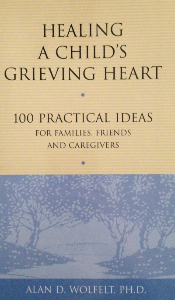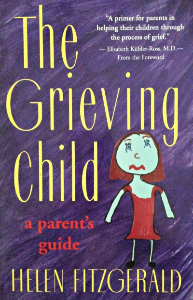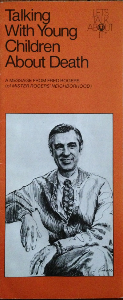In light of yet another horrific hate crime, this time in my hometown of Pittsburgh against the Jewish community in Squirrel Hill, I thought this was a particularly good time to revisit how we discuss tragedy, violence, death, and dying with our kids. This is a conversation no parent dreams of having but more often we are faced with. What are we to do when wanting to comfort a scared or grieving child? We are struggling to process it in our own minds; the last thing we want to do is explain tragedy to our little ones. When I am faced with my own tragedy, I turn to books.
To be sure, books don’t have all of the answers but they are a start. Books are an excellent resource when you don’t know what to say, where to go, or how to begin. Books can comfort you and let you know that you’re not alone. The following are three books that have helped me during a difficult time in my life.
1. HEALING A CHILD’S GRIEVING HEART: 100 PRACTICAL IDEAS FOR FAMILIES, FRIENDS AND CAREGIVERS BY ALAN D. WOLFELT

“A grieving child’s life is like a piece of paper upon which every passerby leaves a mark. What kind of mark would you like to leave on the life of the child whose heart and soul have been touched by the death of someone loved?”
I found this book to be amazingly helpful. Inside it contained more than 100 helpful activities for dealing with grief and mourning. Tip 12 is an example: “Consider the child’s relationship to the person who died…Each child’s response to a death depends largely upon the relationship she had with the person who died…Set aside your own thoughts and feelings and enter her world as you consider this point.” See what I mean? Useful stuff. A child’s grief is not the same as your grief and must be treated differently than yours. Once I grasped that concept, I was able to move through the other practicalities of the book and construct a strategy that worked for each of my children separately.
2. THE GRIEVING CHILD: A PARENT’S GUIDE BY HELEN FITZGERALD

Fitzgerald helped me understand my own death history and confront my feelings about death. “Before you begin talking to your child about the death of a loved one or about death in general, be sure you know where you stand.” The author reasons that “the more you understand yourself, the easier it will be to avoid letting those feelings influence your child.” This, too, was helpful. You don’t want to muck up your child’s understanding of death with your own conflicted feelings. Throughout the book, Fitzgerald offers honest and useful ways handle such situations as whether or not to take the child to the funeral, or deciding when it’s time to seek professional help.
3. TALKING WITH YOUNG CHILDREN ABOUT DEATH BY FRED ROGERS

Talking with Young Children about Death is a brochure I received from a children’s grief therapist. As a long time fan of Mister Rogers, it is not surprising that I would turn to him to help me understand a child’s point of view while dealing with grief. “Children’s sensitivity to ‘vibes’ is extremely keen. At a time of sadness in a family there are so many facial cues, so many disrupted schedules, new people coming and going, lots of conversations to overhear, and a general aura that clearly states that something important is going on.” When you think about it that way, is it any wonder children act out? They know something is going on but no one will tell them in a way that they can understand. That must be incredibly frustrating and scary.
I’ve discovered that by turning to books for any occasion, even tragedy and dying, I can find what I need. Sometimes I find answers to questions, sometimes I find inspiration, sometimes I find a comforting poem or story. Talking with children about tragedy isn’t easy, but if you’re not sure where to begin, why not open a book?